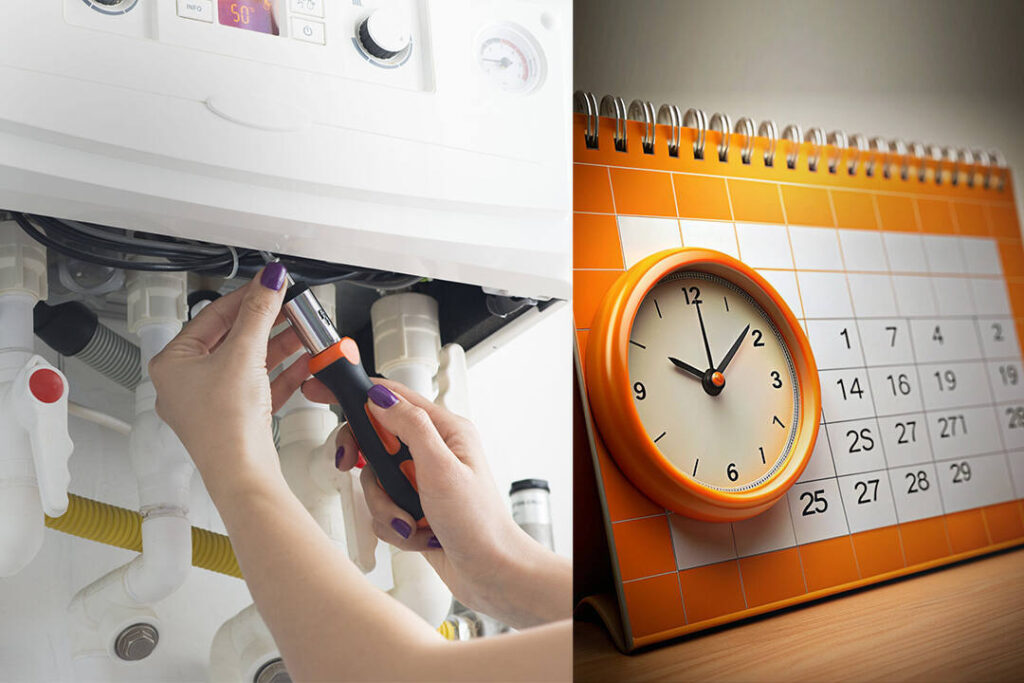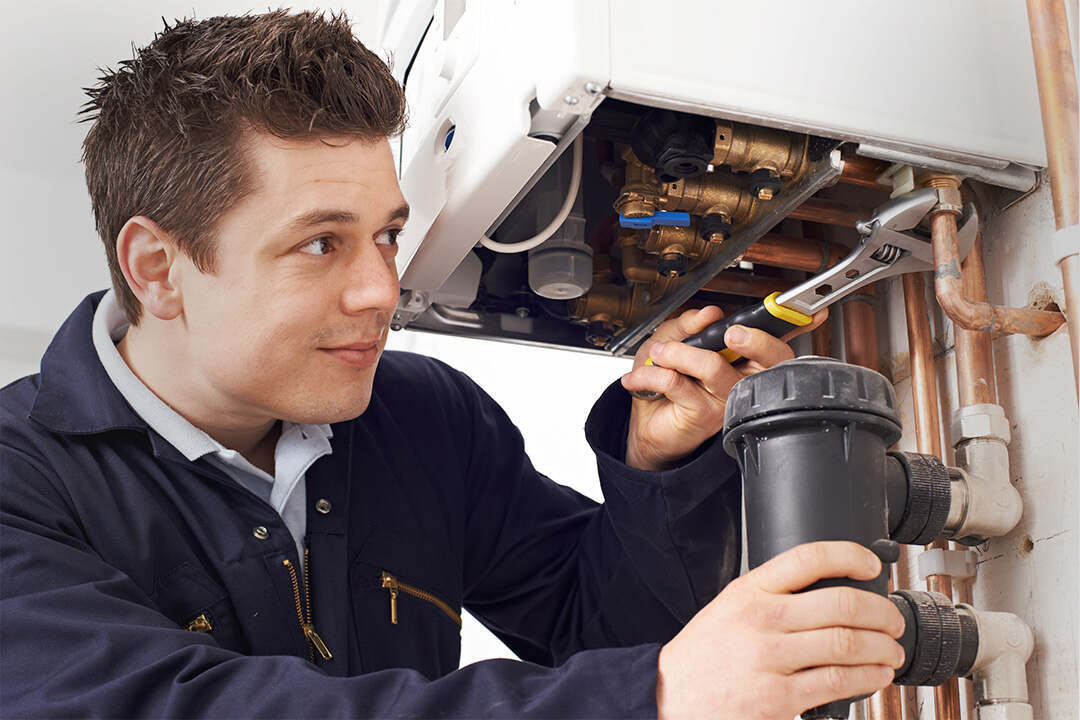Table of Contents
A good and energy efficient boiler is what you need when winter bites to keep your home warm and comfortable. It turns your home into a haven from the freezing wind. But what if it stops doing the job? Knowing how much time it will take to replace a boiler is crucial to saving you from any discomfort and frustration.
Do you need to replace your heating system? Maybe you are just thinking of upgrading. A full replacement may be necessary because it’s outdated or inefficient. Knowing what lies ahead of boiler installation and replacement will help prepare you for this important task. Let’s dive into the essentials — ensuring your home rem ains the comfortable refuge it should be!
The Importance Of A Boiler
A boiler is the lifeline of your home’s heating system. It keeps you and your family cosy during winter. It’s not only about comfort as boilers are also at the centre of offering that hot water required in daily activities. So, a boiler could also be a very integral part of modern life. Efficiency counts as well. An updated boiler, along with its many versions, not only makes the place warmer but also saves much energy by consuming fewer fuels to deliver the same extent of performance.
On the other hand, a well-functioning boiler also improves the quality of indoor air. An inefficient boiler or out-dated boilers may result in such problems as carbon monoxide leakage, which definitely should not be seen as a minor health risk issue. Therefore, the importance of a boiler goes beyond convenience, but safety, efficiency, and general quality of life.
Boiler Type | Average Replacement Time |
Gas Boiler | 1-2 Days |
Electric Boiler | 1 Day |
Combi Boiler | 1-2 Days |
System Boiler | 1-2 Days |
Factors that Affect the Boiler Replacement Time
Different factors determine time to replace a boiler. First, the type of boiler you need is key. Swapping for the same makes of boiler will perhaps take less time than setting up a more complicated system. The size and the dimension of the property in which you reside also play a great role in determining the time of replacement. Complicated access or difficult space can make the installation process become dragged. In fact, depending on the location of your construction project, local building codes and regulations may add some additional inspections or permits before work starts.
If there are already existing plumbing or electrical systems and needs to be upgraded to support a new unit, well, that’s complexity as well.
Weather should not be ignored either; extreme temperatures may interfere with scheduling while technicians are dealing with safety issues when installing.
What Preparations Are Required Before Replacing a Boiler?
In preparation for the boiler replacement, several important preparations need to be done before the process begins to make everything run as smoothly as possible. This starts with assessing your present boiler on its condition, highlighting problems that you will like to correct with the new unit.
Then, investigate various types of boilers available in the market. Decide which one has an efficiency rating that best suits your home and its factors such as size and which one uses what type of fuel for energy. This is an important point to know before hiring an installer.
Gather all the necessary documents, like gas safety certificates or installation records for existing systems which can be required at the new installation process. Never forget budget planning. Get quotes from the appropriate contractors to make sure you spend wisely.
The Actual Process of Replacing a Boiler
It is not easy to replace a boiler, and it is accompanied by a few critical steps. The first step is cutting off the power and water supply going to the old unit. There should always be a professional who takes good care of ensuring that all the safety protocols are followed. The old boiler is then removed with care. It is really a bit intricate because of the space perhaps or if other components have to come out as well. Once that is out of the way, the new boiler comes in. The technician will install it and connect it to gas lines and pipes. All these connections ought to be tight for proper operation.
After installing, they will make leak-tight tests and check-ups for pressure. After the test runs on efficiency and functionality, you will have important information to guide on how to properly operate your new system.
Post-Installation Maintenance and Tips
This boiler requires only a little maintenance once installed. Inspections increase the efficiency and prolong the life of your new boiler. Start with annual servicing from a qualified technician. That is, most of the impending problems need to be caught early before they escalate.
Also, check out the pressure gauge. If the pressure drops too low, you will have to top it up with the filling loop; that is quite easy but very important for proper functioning. Don’t forget to bleed the radiators from time to time since trapped air will potentially interfere with heat distribution. Keep an eye on energy bills immediately after installation, an unexpected sudden surge may indicate inefficiencies or certain malfunctioning parts needing further investigation.
With these tips in mind, you will ensure that you are actually saving money and enjoying those warm winter evenings without worrying.
Cost and Budget Considerations
It goes without saying that cost will be a primary consideration when looking to replace the boiler. The cost will depend largely on what type of boiler you have decided on. Combi boilers are generally more expensive in upfront costs but might be higher to install. Be sure to factor in labour costs as well. Experienced professionals installing your new system may be costly but can ensure your new system operates efficiently. Include considerations in terms of installation time and potential upgrades to or changes in the heating system. It would incur added costs in time consumption as well as total costs. Another source of available financial aid is the free boiler grants, which will alleviate some of the pressures in finances through sharing part of the cost of installation for the eligible homes.
Factors That Affect The Installation Time Of A New Boiler
The installation time of a new boiler varies widely, given a few key factors. The already existing setup is highly influential. If your old boiler happens to be crammed into a tight space, then the time it will take to remove may be more than what you expected.
The boiler type also plays a significant role – Combi boilers are easier to install than the tank and cylinder systems that most people still use.

Replacing or relocating your boiler will have a longer installation time as new piping and electrical may be required.
Also, based on the weather, it may take the technicians longer to finish the work if it entails outdoor changes.
Highly skilled installers just like Berks Insulation may influence scheduling and project completion dates for boiler installation. You should always request the experts for private and location-specific estimates.
Upgrading Your Boiler
Replacing your boiler can make a significant difference in terms of becoming more efficient in your house. Old models burn more fuel than they need to-thus causing your bills to skyrocket and wasting amounts of unnecessary fuel. A new boiler runs at better ratings for efficiency, meaning you save in the long run.
This would include smart technology that would enable you to remotely control heating. Comforts of such sort would add up for comfort while optimising its usage according to a set pattern of your schedule.
Another important aspect of the newer generation systems is that they have been designed to be more environmentally friendly. Most of the options available today are renewable sources or have lower emissions, thus more environmentally-friendly.
Consider space issues when updating. Slim configurations can provide useful storage space where bulkiest traditional units once occupied. This could enable improved functionality as well as appearance in the home setting.
What Does A Baxi Boiler Warranty Cover?
Any fault in a Baxi boiler can be included as a problem that falls within the appliance warranty. It covers defects or flaws in materials or construction, ensuring it works normally. If such manufacturing flaws arise in a boiler at the time of warranty, the rectifications or replacement will cost nothing. The parts of this coverage include heat exchangers, pumps, or circuit boards. However, such regular servicing is usually out of this warranty. Maintenance service will keep your items working properly.
Labour costs for repairs would likely be another aspect to be considered and could be factored into or varied on the specific terms of Baxi. Read the warranty documents for complete details of what’s included. There’s no surprise waiting for you down the line.
Changing Boiler Fuel Types
Changing boiler fuel types is one activity which will have a huge impact on energy efficiency in your home. Most people consider the change in the type of fuel if they want to lower utility bills or make their homes greener.
For example, replacing oil with gas can save on heat bills. Natural gas is generally cheaper and cleaner than most fossil fuels. Another benefit can be to the user if electricity is the major source of heat: switch to a high-efficiency gas boiler.
However, conversion requires proper planning and sometimes even remodelling. You will need professionals who understand local regulations regarding various types of fuels. It’s essential to evaluate the availability of your energy source of choice in your area before you make your final decision.
The right advice will save you money and also make a good contribution toward your sustainability goals. An expert will help you identify possible savings opportunities and guide you through the steps that need to be taken for your successful transition.
Upgrade Your Old Boiler Today!
Relocating Your Boiler
This could breathe new life into your house if you relocate your boiler. It might be either for space or to be more efficient, but relocation is not a thing to do overnight, as it involves many technical considerations. To begin with, the new site chosen must have adequate ventilation and access to gas lines or electrical sources. Relocation also has to be compatible with local regulations. Another thing to consider is convenience. A closer boiler may make hot water delivery to bathrooms arrive faster, thus making mornings smoother.
However, this means that some cost incurring relocation of pipes and fittings. A professional makes sure everything is correctly and safely done. Don’t forget the aesthetic sense. An appropriately placed boiler may harmonise wonderfully with other designs in a home while still maintaining functionality.
Should You Fit A New Combi Boiler?
Changing your old combi boiler can totally transform your home. It’s very important to weigh the pros and cons according to your needs. Combi boilers are compact and efficient. A combi boiler provides hot water on demand, thus liberating you from cumbersome tanks or cylinders. This is of great use when space is less. Consider the number of people living in your household and their usage patterns of hot water. If you have more than one bathroom or big peak demands, you might find a combi not sufficient unless sized appropriately. Energy efficiency is quite important – the newer models will prove a much higher rating, and that should help bring down energy costs after some time.
Installation costs need also to be factored into your decision-making process. True, the upfront costs might be almost astronomical, but many homeowners do realise long-run savings through reductions in energy consumption and maintenance requirements.
It is only by assessment of these points that you would know if the new combi boiler installation would help you in terms of your heating goals and lifestyle preferences.
Other Aspects To Consider When Fitting A New Boiler
With the installation of any new boiler, it would be no good to ignore the energy efficiency. Fit an energy-efficient version and make a significant reduction in your utility bills and carbon footprint.
Do not forget to evaluate the space you will have available for placing it. If you have not much space, then a model with smaller dimensions will be preferable but generally speaking, the more spacious ones hold more functions. Not to forget to check compatibility with the other systems you are already using. Ensure that your new unit cooperates well with your radiators or underfloor heating you are currently using.
Don’t forget to consider noise levels. Some are designed to be quiet, which is something particularly important in the home, where peace and quiet is a priceless commodity. Check on permit and inspection requirements in your locality. Compliance is pretty crucial for safety and functionality, and you can avoid getting fined in the future.
Conclusion
The process of replacing a new boiler is a serious task and encompasses detailed considerations. Knowing how essential your boiler is, as well as all considerations relevant to putting it up in the shortest amount of time possible, helps you in making wise decisions. Proper preparations for the replacement can, therefore, go along smoothly as everything goes according to plan. It is with this consideration that replacing your boiler would meet the urgent needs as well as long-term goal perspectives.
Frequently Asked Questions
The standard answer is typically 1 to 2 days to relocate a boiler or install a new boiler. However, this will actually depend on the kind of job required, since whether your boiler is being relocated or if it is a like-for-like boiler. Chances are you won’t find one replaced in under 1 day.
Not only does this take less time, but also your heating and hot water need to be turned off during the process, and sometimes it can be dirty. The actual time it may take to install depends on factors such as whether the new boiler is a like-for-like replacement or not.
When you are going to purchase a new boiler, consider the size of your property as it will factor into the time of replacement. Similarly the number of occupants also factor as it signifies the usage of hot water. If your boiler energy efficiency is below 80%, it is time to replace your inefficient boiler with the energy efficient boiler. It is worth using A-rated condensing boilers.



